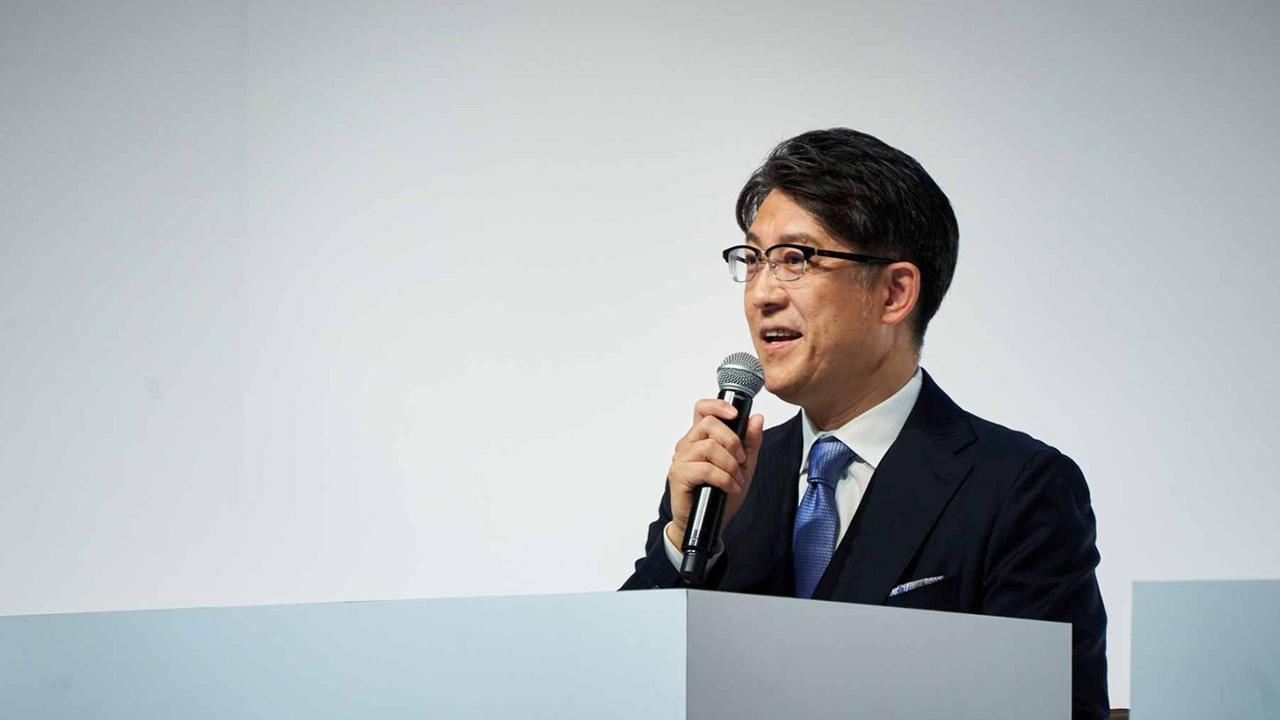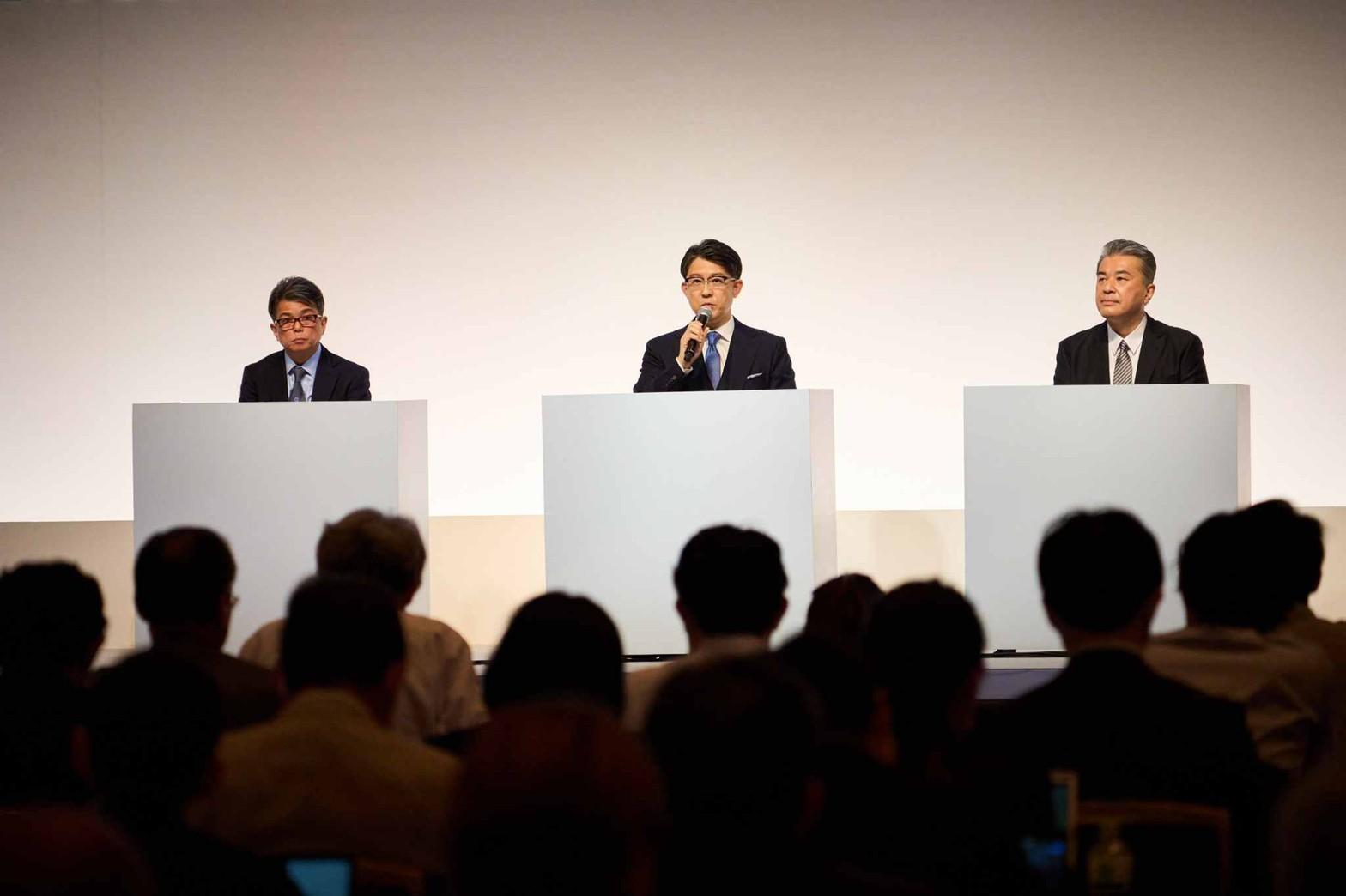
The questions and answer session at a recent conference dug deeper into two ideas expressed by the new management team: "carbon neutrality" and "expanding the value of mobility."
Idea II: Expanding the value of mobility - Transforming into a mobility company
Another idea that Toyota discussed that day was the Toyota Mobility Concept.
Three fields were presented where Toyota is working to promote its transformation into a mobility company: transitioning cars to mobility, expanding mobility access, and synergizing mobility with infrastructure.
As electrification, intelligence, and diversification advance and cars become connected to infrastructure, how will Toyota change? The questions continued.

--As you seek to implement the Toyota Mobility Concept, how is Toyota going to change? How will you be able to achieve your transformation into a mobility company?
President Sato
The automotive industry is now at a once-in-a-century turning point.
To continue being an attractive industry, we believe the industry as a whole needs to communicate more openly and evolve in synergy with public systems, while building on our established core competence of carmaking.
For that, we need to implement collaboration within the industry and with other industries, and consider how the car must evolve from the perspective of mobility within society.
We will keep cars as our starting point while still accepting that our mission is to evolve cars and consider along with all our many colleagues what we can do to achieve that mission, as we continue the cycle of trial, verification, and kaizen.
The resolve to engage in that kind of initiative stands at the heart of our revealing the Toyota Mobility Concept.
There are still many things we need to make more concrete, but first, we just need to align vectors and move forward.
--Where exactly is the "evolution" in relation to "inheritance" focused on products? What ideas are held in your future products?
President Sato
I think the thing we most need to ensure we inherit is the Toyota carmaking philosophy.
As the phrase "Let's make ever-better cars" indicates, there is no end point for carmaking. I also think there's no single definition either.
But what we must not change is continuing to pursue that original goal of providing safe, reliable, and enjoyable transportation for as many people as possible.
Society is diversifying and so are customer tastes. We are a company that emphasizes mass production, so we cannot impose specific values, but rather respond to diversifying needs with diversity.
From there, what do we need to evolve? I think we need to pursue even higher added value for cars.
For example, even if you own a car, it's parked about 80% of the time. There are still limits on use frequency and the experience value we can offer through cars.
If we can offer new added value there, we can expand the potential of cars and change what their position should be.
We will achieve at least one or two of the things we've brought up today. And I believe that is the evolution we need to bring to the world.
Raising our existing added values and preserving the inherent value of the car. That is how we need to understand "inheritance and evolution."
Vice President Nakajima
Whether it's a BEV, HEV, gasoline engine, or a diesel engine, I think that for the customer, the most important thing is "it's fun to drive."
The answer is that's the kind of carmaking we want to offer, responding to the needs of every individual customer while preserving our core of mass production.
Up to now, we've only ever used hardware as our implements.
We've tried to take on the challenge of making cars more appealing, but we are moving into a new age where cars are becoming an OS service which will make it easier to offer each customer a specialized car by integrating various applications.
At Toyota, we have lots of very popular cars we call "long sellers." There are also cars that have stopped production, and you can no longer buy them as well.
But using software technology makes it possible to revive the driving feel of those old cars in a new BEV.
That's the kind of carmaking we can offer in the future, using both hardware and software to connect cars and people, past and future.
This is getting me more and more excited. I want to keep moving forward toward that kind of carmaking.
--As a mobility company, you claim you will contribute to solving social issues, but how will you make that work as a business?
Vice President Miyazaki
I'd like you to imagine an industrial park. Every morning, employees commute to work. There are people using shuttle buses, driving their family cars, and so on.
People using shuttle buses, for example, could use their smartphones to schedule a time, and a carbon-neutral bus could come pick them up and take them to the plant.
People driving private cars could be in a carbon-neutral car and park at a nearby parking lot.
And using renewable energy, we could make a system to display open parking spaces. We can even "produce," "transport," and "use" hydrogen, and we can offer fire engines and ambulances as well.
I think we can offer up ways to use and leverage the technology we already possess.
If we could create a single industrial park like that, we could then adapt that to all kinds of locations like ports, airports, and so on. I think there is lots of potential in building a business model out of it, including infrastructure system design and sales.
--They say the automotive industry is a "fierce life-or-death struggle." Can Toyota survive through its transformation to a mobility company? How is your resolve to lead the whole industry's transformation, including the way you work with partners?
President Sato
I think there are still lots of possibilities open to the automotive industry. I think it's down to whether we have the courage to act and make structural changes.
The path we are following is one that will increase the added value of cars while revolutionizing the structure of the automotive industry.
Or to create new value by evolving cars and integrating them into social infrastructure.
I think that's the only way for the automotive industry to step away from its current structure and create more collaborative efforts, so that it can look forward to a brighter future.
To make the automotive industry one that appeals to many, I'd like to work in making changes step by step, one by one.

